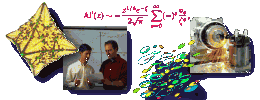A Preview of Fortran 2000
William Mitchell
Mathematical and Computational Sciences Division
Tuesday, March 18, 2003 15:00-16:00,
Room 618, NIST North (820)
Gaithersburg
Abstract:
For more than 40 years, Fortran has been the most popular computer
language for scientific computing. This is due in part to its
original intent of providing an easy means of expressing mathematical
formulas, and in part to its evolution over time to adopt proven
programming language methodologies while maintaining backward
compatibility. The next Fortran standard, commonly called Fortran 2000,
is nearly through the standardization process and will soon be the
Fortran standard.
Fortran 2000 is a major extension of the current standard, Fortran 95.
Many of the new features concern object orientation. These include
parameterized derived types, pointers to procedures, extensible types,
procedures bound to a type as operators, and polymorphic entities. A
second major aspect of Fortran 2000 is to standardize interoperability
with the C programming language. The new features here provide portability
for Fortran codes that call C routines to access hardware features or
libraries written in C, and for C codes that call Fortran routines for
better efficiency or access to legacy numerical codes. Other new
features include derived type, data manipulation and I/O enhancements,
access to command line arguments and environment variables, and
improved exception handling.
In this talk we will present an overview of the new features of Fortran 2000,
including examples of how they may be used. The talk is based on the article
"The New Features of Fortran 2000" by John Reid (a member of the
Fortran
standards committee), published in ACM Fortran Forum.
Contact: W. F. MitchellNote: Visitors from outside NIST must contact
Robin Bickel; (301) 975-3668;
at least 24 hours in advance.
|




